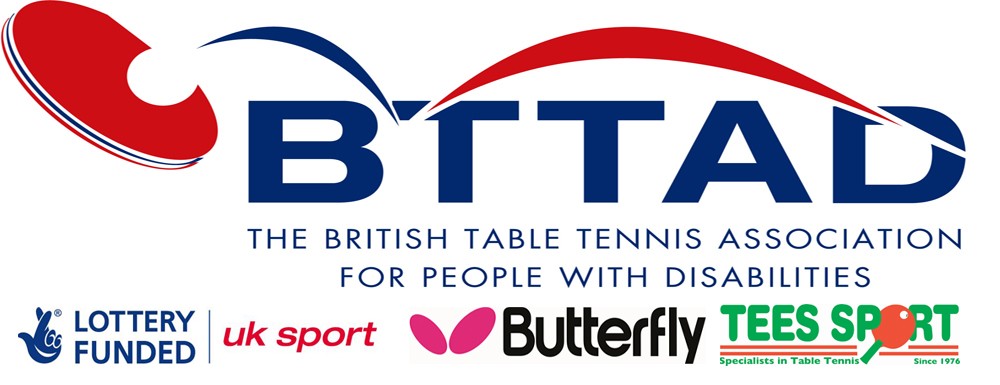The GB Para Table Tennis team’s two World number ones Will Bayley (men’s class 7) and Rob Davies (men’s class 1) both took gold today in the singles at the ITTF PTT Slovenia Open to lay down a significant marker ahead of the Paralympic Games in September. London 2012 bronze medallist Paul Davies completed a stunning comeback after two years out through injury to take silver in men’s class 1 and Kim Daybell took bronze in men’s class 10.
Sheffield based Bayley played superbly to beat the World number two Maksym Nikolenko in the final 3-1, having earlier avenged his defeat by Jordi Morales in February’s Italian Open, beating the Spaniard 3-2 in a tense quarter-final, and then defeated the World number four Mykhaylo Popov 3-0 in the semi-finals.
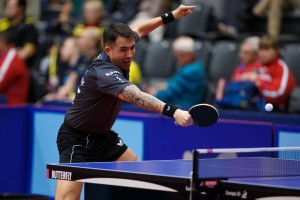 “I’m massively thrilled because it has been a lot of hard work,” said the 28 year old from Tunbridge Wells. “There were definitely times that maybe people doubted me but I stuck to what I know best and have worked as hard as I can and it’s starting to pay off. But it’s not done yet - I still need to push on now and improve even more but it’s a good marker at the moment to where I am.
“I’m massively thrilled because it has been a lot of hard work,” said the 28 year old from Tunbridge Wells. “There were definitely times that maybe people doubted me but I stuck to what I know best and have worked as hard as I can and it’s starting to pay off. But it’s not done yet - I still need to push on now and improve even more but it’s a good marker at the moment to where I am.
“Morales is a very clever player and makes it really difficult for me to play my natural game so it’s mentally tough to play him as well. I felt that once I got through that game I could win the tournament. I had a game plan against Nikolenko - he’s so strong and hits the ball so hard. I had to find a way to stop him doing that and I found it today and I felt pretty much on top of him throughout the match so it was one of my best performances against him for sure.”
Rob Davies came through his quarter-final against Silvio Keller from Switzerland 3-1 and played a great match to beat the Paralympic champion Holger Nikelis 3-0 in the semi-finals. In a repeat of the all GB European Championships final in 2013 he survived a spirited fightback by his fellow Welshman Paul Davies to win the match 3-1 and take the gold.
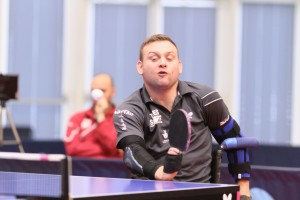 “I am really happy,” said the 31 year old from Brecon. “At the start of the competition I really wanted to get to the final and I did that and when I saw that Paul was in the final as well it was a bit surreal. I was so pleased for him after he has been away for two years and to come back and play like that and get to the final is unbelievable.
“I am really happy,” said the 31 year old from Brecon. “At the start of the competition I really wanted to get to the final and I did that and when I saw that Paul was in the final as well it was a bit surreal. I was so pleased for him after he has been away for two years and to come back and play like that and get to the final is unbelievable.
“I’m really chuffed with the way I played against Holger in the semi-final. I’ve got a lot of respect for him - he is the Paralympic champion and the guy I wanted to emulate when I first started playing table tennis. So I was chuffed to beat him and to beat him 3-0 puts down a marker and I want to do the same in Slovakia next week if I can. It’s a big boost - I can play better than I have here I know that but I guess Rio is the time to do it.”
It was a remarkable performance by Paul Davies - beating the World number two Jean-Francois Ducay 3-1 to reach the final after such a long absence.
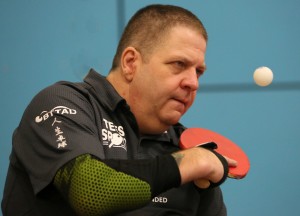 “I’m over the moon - it’s like a fairytale,” said the 49 year old from North Cornelly. “I didn’t think I would get out of my group so I’m overwhelmed. I tried to stop him (Rob Davies) but he is another class act - he is on top of his game and the best of luck to him. I’ve got another four months to train before Rio so you never know but he deserves it - he was the better player on the day and he’s World number one for a reason. But for me to beat the World number two and play the World number one in the final after 22 months away is not a bad achievement for an old guy.”
“I’m over the moon - it’s like a fairytale,” said the 49 year old from North Cornelly. “I didn’t think I would get out of my group so I’m overwhelmed. I tried to stop him (Rob Davies) but he is another class act - he is on top of his game and the best of luck to him. I’ve got another four months to train before Rio so you never know but he deserves it - he was the better player on the day and he’s World number one for a reason. But for me to beat the World number two and play the World number one in the final after 22 months away is not a bad achievement for an old guy.”
Leeds University medical student Daybell looked to be heading for the final of men’s class 10 when he took a deserved 2-0 lead against the World number seven Lian Hao but the Chinese player worked his way back into the match and eventually clinched it 11-8 in the fifth.
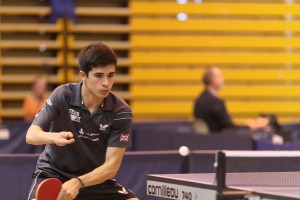 “From 2-0 up I was in a strong position and then he changed the way he played,” said a clearly disappointed Daybell afterwards. “ It’s exactly the same as what happened in London against the same player - I was 2-0 up and he changed his tactics and to be fair he played well to come back. I think overall I’ve played a good singles competition - it’s a shame I couldn’t have won that match but by having a good win in my group (against Chinese World number three Ge Yang) I’ve shown that I’m definitely competing with the best players in the world and it’s a good stepping stone towards Rio.”
“From 2-0 up I was in a strong position and then he changed the way he played,” said a clearly disappointed Daybell afterwards. “ It’s exactly the same as what happened in London against the same player - I was 2-0 up and he changed his tactics and to be fair he played well to come back. I think overall I’ve played a good singles competition - it’s a shame I couldn’t have won that match but by having a good win in my group (against Chinese World number three Ge Yang) I’ve shown that I’m definitely competing with the best players in the world and it’s a good stepping stone towards Rio.”
In men’s class 8 Ross Wilson came through his last 16 match 3-0 against the 17 year old Russian Artem Iakovlev, who had beaten World number five Piotr Grudzien 3-0 in the group stages, and his reward was a quarter-final against the World number one and World champion Viktor Didukh. The Ukrainian was in top form and won in three sets but the 20 year old from Minster is still a work in progress and is improving all the time.
“I’ve had a good singles competition,” said Wilson. “I’m going to learn from this and come back stronger next time. You can always think you could have done something different but I’m just going to try and figure out his (Didukh’s) game a bit more and I’ll be able to do that in training - go back and watch the videos and learn from it.
Aaron McKibbin also won his last 16 match, coming back from losing the first game against Marcin Skrzynecki from Poland, the former European champion and World and Paralympic team gold medalist, before clinching the win 12-10 in the fourth. He paid the penalty for a poor start in his quarter final against Emil Andersson and although McKibbin fought his way back into the match the Swedish World number seven took it 11-8 in the fourth.
“I had a really bad start to the match,” admitted the 24 year old Londoner, “and he really got on top of me. It took me too long to get going and against a player like that you can’t really afford to do that. The last two sets I felt I was into the game and the better player but I knew it was going to be tough as he’s a top player. It was just disappointing to have had such a bad start to the game. If I could have started earlier it could have been a different result.”
Wilson and McKibbin can now look forward to playing in the team event with Bayley for the first time since they took the bronze in London 2012.
Billy Shilton was up against Richard Csejtey, the former World champion and World number nine in his last 16 match and it was the Slovakian’s experience that proved decisive although the 17 year old can be proud of the way he fought back from 2-0 down to take the third game 14-12 before Csejtey secured the win 11-8 in the fourth.
“I think I played very well,” said Shilton, “and to be honest he was just better than me today. I really struggled with his serves. It would have been tighter if I could have returned his serves a bit better but apart from that it was really good. I was 9-5 up in the third so I was a bit nervous when he got back to 10-10 but I actually kept my head and won the set. After that it was anyone’s match and it was just towards the end that I struggled a bit. Apart from that I played well.”
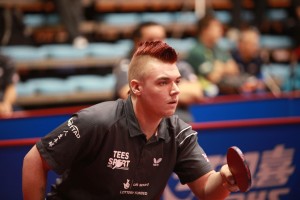 In men’s class 5 Jack Hunter-Spivey pushed the World number one from China Cao Ningning all the way in his quarter-final, taking the third game 14-12 before eventually losing 11-7 in the fourth.
In men’s class 5 Jack Hunter-Spivey pushed the World number one from China Cao Ningning all the way in his quarter-final, taking the third game 14-12 before eventually losing 11-7 in the fourth.
“I played a good game against him,” said the 20 year old, “and it was good experience for Rio because I haven’t played against him many times and he has a very different style. His service is really good so to get practice against that is invaluable for me - I’m trying to do what I’ve been working on in training and it is paying off. I’m fighting for every point and that is all I can do at the moment. I’m feeling really positive about the way I’m playing. I’m not playing my absolute best which is a good place to be with Rio four months away so I’m feeling really good.”
David Wetherill came through his last 16 match against Raimondo Alecci 3-0 but never really got into the match in his quarter-final against Peter Rosenmeier, losing 3-0 to the Danish World number two.
“It was one of those games,” said Wetherill. “I was fighting but I didn’t have it today.”
Paul Karabardak made a good start in his last 16 match against Pavao Jozic from Croatia but was beaten 3-2 by the 21 year old European team bronze medalist.
“He played some good stuff,” said the 30 year old Welshman. “I thought I played quite good but he played better towards the end of the fifth set and deserved to win the game in the end. I missed the consistency to play well for long periods today - I was only playing well for a few points at a time so I think inconsistency has cost me the match. Hopefully I can produce my best in the team event.”
Sara Head was outplayed in her quarter-final by the Chinese World number four Xue Juan but can take plenty of positives from her performance in the singles here.
“It was a tough draw,” she admitted. “She is a brilliant player. I enjoyed the match and learnt some new things and I’ll take those away and try again. I’ve played both Chinese players so at least that’s a good thing ahead of the team event.”
Ashley Facey Thompson lost his last 16 match to the World number five Juan Perez Gonzalez from Spain 3-0.
“With nearly all the world’s top players competing here, to take four medals in the singles including two gold medals shows that we are on track for Rio,” said GB Performance Director Gorazd Vecko.
The competition continues with the team event that concludes on Saturday.
